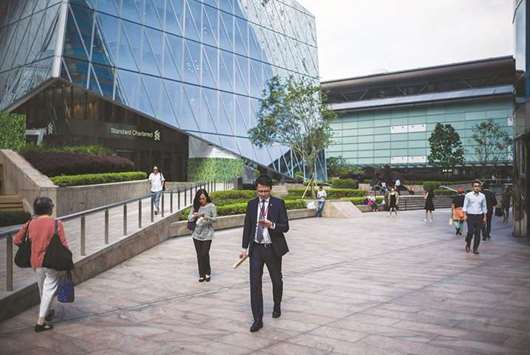Share buybacks are catching on in Hong Kong. Companies listed in the city have poured an estimated HK$25bn ($3.2bn) into repurchasing their own shares this year through July 25, the highest for the period since 2008.
Corps in the world’s fourth-biggest stock market are spending more on buybacks as nearly a decade of record-low interest rates looks poised to end. Just as they did after the global financial crisis in the US, the practice is giving a boost to Hong Kong’s equities, which are the cheapest among the world’s largest markets even after rallying every month of this year to a two-year high.
“Compared with the rest of the world, Hong Kong stocks’ valuation has risen, but is still quite cheap,” said Philip Li, a money manager at Value Partners Ltd who oversees two funds that seek stocks that pay back investors through buybacks or dividends.
“Hong Kong companies are following what their global counterparts are doing and hoping to get a re-rating.” He added that the trend is likely to continue and that it will give the market an additional boost.
Steven Sun, head of China equity strategy at HSBC, wrote in a note this month that strong inflows from the mainland and increasing appetite among foreign investors for Chinese assets, as well as the buybacks, will support the Hong Kong market.
The Hang Seng Index has advanced 6.1% in July, its biggest monthly gain since January. HSBC Holdings jumped as much as 3.2% to a 2 1/2-year high in Hong Kong on Monday after saying it will spend up to $2bn buying back stocks as profits beat estimates.
The buybacks started recovering last year as companies took advantage of reduced valuations and a narrowing window of low borrowing costs, which made it cheaper to fund the purchases and less attractive to hoard cash.
While ample liquidity has capped local interest rates so far, they are likely to rise soon as Hong Kong’s currency peg to the US dollar compels the city to follow the Federal Reserve in raising borrowing costs.
Even during the Hang Seng Index’s 24% rally this year, just three juggernauts have accounted for half of its gains.
This may have encouraged some laggards to buy back shares, said Tony Chu, a Hong Kong-based fund manager at Victory Capital Management.
In the US, share repurchases jumped along with share prices from 2009 before peaking in 2015, when benchmark borrowing costs began to rise. Buybacks by S&P 500 stocks reached $548bn in 2016, lifting the market to new highs but also fuelling criticism that companies were artificially inflating share prices instead of investing in their businesses. Nevertheless, equities have extended their record highs.
Hong Kong’s property sector, which accounted for almost 60% of buybacks this year, is an illustration of how the practice can be both a short-term boon for shareholders, and a signal that the industry’s long-term prospects may not be so bright.
With their Chinese counterparts bidding aggressively for the city’s land, many local developers have stayed on the sidelines, using their cash to focus on purchasing their own shares instead, said David Ng, an analyst at Macquarie Group in Hong Kong. “Prices are not that affordable these days,” he said. “They cannot find easy investment channels, so they’d rather use that money to buy back their own shares.”
Cheung Kong Property Holdings alone lavished an estimated HK$7bn on repurchases this year through yesterday, the most among all Hong Kong stocks.
The shares gained 32% during the period, outperforming both the Hang Seng Index and a measure of local property stocks.
The values of the buybacks are estimated based on closing prices.
Still, Value Partners’ Li says it’s too early to worry about whether increasing buybacks indicate a lack of investment opportunities. The Hang Seng Index is trading at 12.4 times 12- month forward earnings, just slightly above its 10-year average, and forecasts for earnings per share over the coming year have risen to a two-year high.
“Buybacks are still at a preliminary stage, so I’m not too concerned,” said Li. “If you only rely on buybacks but earnings are bad, I’d be concerned, but that’s not the case now.”

People walk outside the Hong Kong Stock Exchange building. The Hang Seng Index has advanced 6.1% in July, its biggest monthly gain since January.
